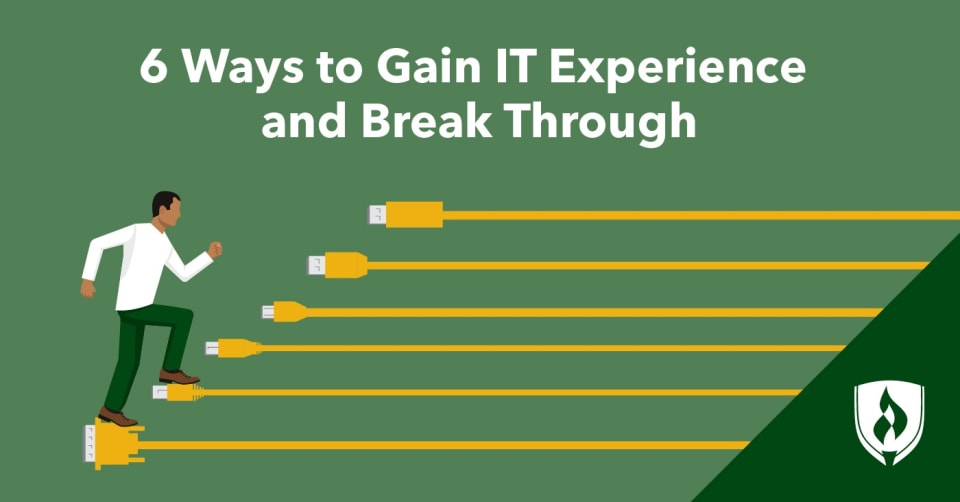6 Ways to Gain IT Experience and Break Through
By Will Erstad on 11/29/2021

It’s no surprise you’re curious about a career in information technology (IT). Computers, and the networks connecting them, play an important role in nearly any business or organization. That prominent role in business operations means employers are looking to maintain and grow their IT teams.
In fact, employment of professionals in computer and IT occupations is projected to grow at a faster-than-average rate of 13 percent from 2020 through 2030, according to the Bureau of Labor Statistics.1
That’s enough to pique most anyone’s curiosity, and doubly so if you’re already tech-savvy. But when it comes time for newcomers to apply to these roles, they might run into the age-old catch-22: I can’t get a job without experience, but I can’t gain experience without getting a job. It’s a frustrating dilemma for a countless number of aspiring professionals, but it’s not insurmountable.
So what can a rookie do to gain some IT experience? Are there other ways to bolster your resume when you have limited work experience? Do the requirements listed in job postings really matter that much? We got in touch with some seasoned IT pros to get their advice on how you can gain valuable IT experience, as well as their perspective on dealing with entry-level job posting requirement “sticker shock.”
Do job posting requirements really matter?
The short answer to this is yes—but with some important caveats to keep in mind. Before we get into how you can improve your entry-level IT resume and help close any perceived experience gaps, it’s important to understand how many employers approach job postings and their search for a suitable candidate.
If you’re browsing entry-level IT job postings and seeing a lot of seemingly lofty requirements listed, it’s natural to feel a little bit discouraged. But that shouldn’t always hold you back from applying. Consider a job search from the employers’ point of view.
“Here is an insider secret: Job postings are more of a wish-list than hard and fast requirements for many employers,” says Paul French, managing director of Intrinsic Search.
That doesn’t mean you should throw all listed requirements out of the window. Just understand that there’s often some flexibility in what would make an acceptable candidate.
“Most job postings describe a basic set of requirements that are non-negotiable and then a list of skills that are useful to have on the job,” says Neerav Mehta, founder of Red Crackle.
Before you decide against applying for a role, you’ll first want to determine if you’re at least close to hitting the key requirements of the job.
“I would recommend looking at 3-4 job postings for a similar position to determine the common key requirements; these are the non-negotiables,” French says. “As long as you meet these core requirements, you can apply despite not checking all the nice-to-haves.”
6 Smart ways to gain IT experience
While it might help to know that you’re not going to be automatically disqualified for missing a few requirements, there are still several things you can do to build experience and further pad your resume.
1. Do it yourself
IT isn’t a field of abstraction. While knowledge certainly matters, the real bottom line for hiring managers is what you can do. This could be why so many entry-level IT jobs still expect their candidates to have experience. So what you need is a way to show employers that you can walk the walk.
“Start tinkering,” suggests Ben Landers, CEO of Blue Corona. “Build something. Buy some servers or get some donated from a company and do something with them. The best way to learn is often to stop contemplating and to take action.”
Computer systems and networking equipment are upgraded so frequently that businesses, schools and even consumers often give away outdated equipment. Obtaining used equipment can provide great material for practice and experimentation.
“Build a lab at your house,” advises Stephen Tullos, service manager at The Purple Guys. “When we interview inexperienced applicants who have the ‘book smarts,’ a home lab shows passion, hunger and hands-on knowledge.” Tullos adds that they ask about home labs even while interviewing more experienced professionals. “It shows initiative to continue their education.”
Getting your hands dirty on projects at home will allow you to hone your skills without the fear of damaging a company’s expensive investment. Once you feel comfortable on your own equipment, expand your services to your friends or family.
It might not seem like a big deal, but helping a friend recover from a computer virus or setting up a wireless router for a family member’s small business are examples of tangible ways you can demonstrate and hone your expertise. When you’re just getting established, every bit of tangible experience counts—you just need to actively seek it out.
2. Earn professional certifications
Earning industry certifications is a great way to gain and showcase your IT experience before getting hired somewhere. These not only refine your skills, but provide a controlled, at-a-glance verification of a candidate’s technical abilities to potential employers.
They’re not just for the rookies either. IT certifications are often necessary even among seasoned professionals in the field to stay current with technological advances. With that in mind, you might as well add a few to your resume now. Passing these industry exams also helps showcase any specialized areas of technical study you’ve chosen to pursue—information security, for example.
3. Volunteer your services
Similar to the “just get your hands dirty” approach, volunteering allows you to build IT experience, which highlights your initiative.
“Consider volunteering your time in exchange for experience,” French says. “A candidate I met started out making simple websites for local community organizations and shelters before eventually getting paid work.”
Keep an eye out for opportunities with local non-profits, religious organizations and professional groups. Big or small, these projects reflect well and show you’re invested in growing professionally. That can go a long way, according to French.
“The truth is many entry-level positions do not require a whole lot of experience—if you can show you have the basic skills, passion and interest to learn, you can launch your IT career,” French says
4. Seek out internship opportunities
“For information technology students who prefer a more organized approach, the best way to gain industry experience prior to graduation is an internship,” Landers says. And don’t stress about whether or not the internship comes with cash or school credit.
“Paid, unpaid, summer, during the school year, for-credit or not, it doesn’t matter,” Landers says. “And for students who think the internship market is competitive, just wait until you are competing for a full-time position.”
Checking out local job boards and seeking out your school’s career resources are good places to start. But don’t be afraid to reach out to local companies without visible internship job postings. Sometimes a company could benefit from an intern but hasn’t yet considered the need for one. You’ll never know unless you ask, so being proactive is always a good idea.
5. Network, network, network!
Never underestimate the power of meeting in person—especially in the tech industry. IT is a surprisingly collaborative field, so candidates who can represent their ability to connect with other professionals (e.g., dropping a comment like “my mentor suggested…” in a job interview) will stand out from candidates who go it alone.
Go to professional networking events for the areas you want to get into. Whether that’s for web development, project management, software engineering or another niche, it helps to learn about the projects these professionals are working on.
Forming professional relationships is also a great way to keep a pulse on what’s happening in the IT industry. If you are unsure of where to start, do some research on IT events in your area. Follow industry leaders and organizations on social media and maybe even reach out to some directly. Many professionals are happy to share their wisdom and career advice with the next generation of tech pros. Landers says he wishes more students would reach out.
6. Get educated
You likely know by now that a technology degree is not always essential to getting your start in the tech world, but formal education certainly won’t hurt to have on your resume. When faced with a decision between two candidates for one position, possessing a degree could very well be the deciding factor.
Most technology degree programs place a strong emphasis on hands-on training, which will allow you to acquire practical experience within the safe confines of a classroom. Many courses are also facilitated by professionals currently working in the field. Being able to develop your skills under expert supervision is just one of the many benefits to earning your degree.
Make it happen
You have the roadmap to breaking through the perceived experience barrier to entry-level IT jobs—so what’s stopping you? While not all of the suggestions above may be feasible in your situation, you should still have options for bolstering your resume and entering the job search with confidence.
“Don't let a lack of formal experience discourage you from entering the field—that’s how everyone started anyway,” says French.
Start small, and you’ll have a much better idea of what you need to land your dream tech job. It could be something you haven’t even considered yet. Want to learn more about what an information technology career could have in store for you once you get yourself established? Check out our article “Exploring Top IT Job Titles for Every Stage of Your Career.”
1Bureau of Labor Statistics, U.S. Department of Labor, Occupational Outlook Handbook, [accessed October 28, 2021] https://www.bls.gov/ooh/computer-and-information-technology/home.htm. Information represents national, averaged data for the occupations listed and includes workers at all levels of education and experience. This data does not represent starting salaries. Employment conditions in your area may vary.




